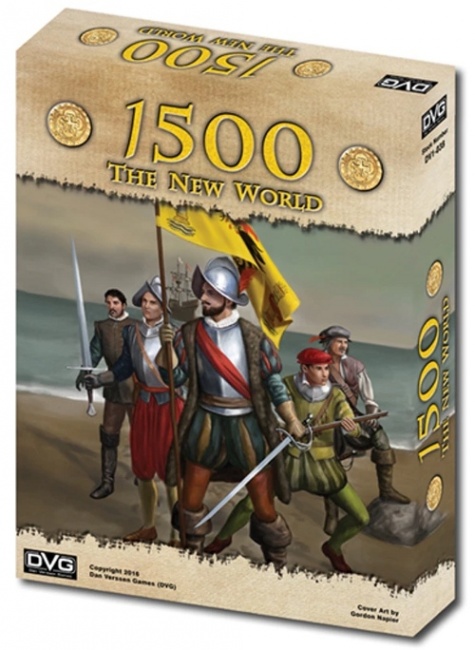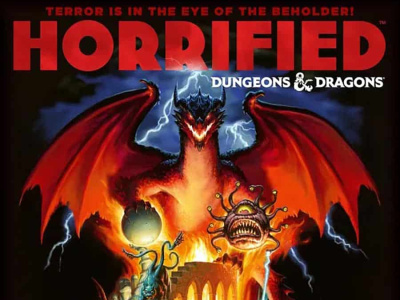1500: The New World
Publisher: Dan Verssen Games
Release Date: December 2017
Price: $49.99 (plus five expansions, $24.99 ea.)
Game Designer: Dan Verssen
Format: Board Game w/ cards
Number of Players: 1-6
Playing Time: 20-45 minutes
Product #: DV1-009
Age Rating: 12+
ICv2 Rating: 3 Stars out of 5
This is a fun, non-serious strategy game based on the European powers conquering the New World in the 16th Century. There is a bit too much luck involved for this to be a serious game, which makes the expansions problematic. Each country (there are five different ones) comes in a separate pack, with an additional $24.99 price. Each expansion pack contains the "personalized" version of one nation’s cards, and the "robot" version of cards needed to play the game solitaire with that nation, or to play it much better with a small number of players. It’s a weaker game with these nations running automatically, as it creates a weird "everyone try to not be in first place" syndrome. So, the special decks, run by an actual player, are the best part of these expansions.
In any case, that makes this a very expensive game, nearly $175 by the time you add all five expansions. For the actual game, this price will be too high for some gamers.
On the positive side, the cards and board are very good quality, and the wild effects of the cards themselves make this into an enjoyable abstract game. The players learn a little about actual history, but really create their own peculiar alternate "history" over the course of a quick game. The expansions provide special cards for each nation, but without serious study of that nation’s history, players won’t understand the reasons for the special cards. Thus, it becomes more of an abstract game, played on an artificial version of a map of North America and South America. The placement of goods by region add to this disconnect, as it leads to nations trying to create odd patterns of colonies, to gain point bonuses.
Each player gets only a few turns, involving a limited number of plays of cards, so there are plenty of chances to mess up your opponents (or yourself) by the play of the cards. The weakness is that it is possible to end up with cards for a turn or more that simply don’t advance your goals or earn you victory points. In addition, if your opponent has the cards needed to negate your score or your advances, one of your turns could go for little or no benefit. In play, we saw players take over most of the board in a single turn, and then be reduced to almost nothing by the next. Victory points for actions swung wildly, depending on the cards in the hands of the other players at the time.
The basic version of the game, without expansions, has balance between the players, but the actual effect is that the more players you have, the more chaos and luck are involved. With the expansions, it’s the other way around. If you have all five expansions in use, in a five-player game, the different decks possessed by each nation make the game wildly swingy, but interesting. Learning how to use your nation’s special cards is at the heart of the expanded game. All of the colonies a player has established may be gone by that player’s next turn, but at least they do get a turn. Player elimination is nearly impossible, but player devastation due to card luck can and does happen.
The playing time listed on the box is more than a little optimistic. For a game with four or more players, the playing time can be more like 60-90 minutes, but since each player has the opportunity to interfere with the actions of other players, no one is left out of the action for long periods of time.
For serious gamers, the wild swings of card-drawing luck may be a drawback. It is still a good game for less serious players, or when a mixture of adults and teens want to play together, but try the basic game first, and then buy the expansions if your group likes the concept, but wants more variety and strategy.
--Nick Smith: Library Technician, Community Services, for the Pasadena Public Library in California.

ICv2 Stars: 3 (out of 5)
Posted by Nick Smith on March 13, 2018 @ 1:39 pm CT
MORE GAMES
New Booster Set
August 7, 2025
Bandai will release Union Arena TCG: Kaguarabachi , a new booster set, into retail.
New Tile Placement Game
August 7, 2025
DV Games will release Koi , a new puzzle board game, into retail.
MORE REVIEWS
ICv2 Stars: 3.5 (out of 5)
July 30, 2025
Here is a review of Ravensburger's Horrified: Dungeons & Dragons.
ICv2 Stars: 3.5 (out of 5)
July 24, 2025
Check out the review of Disney Villainous: Treacherous Tides, from Ravensburger.








